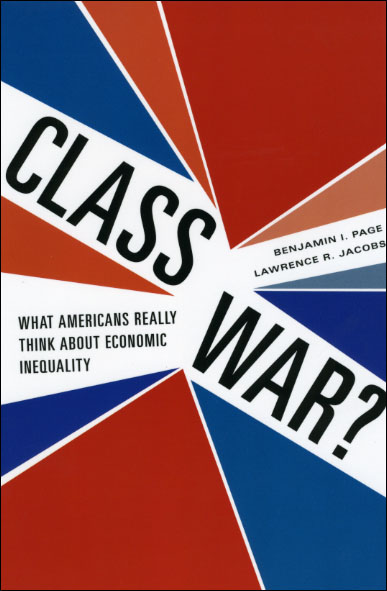Scott McLemee’s Class War
 Scott McLemee’s column this week for Inside Higher Ed, titled “Stop the Insani-Tea!”, starts by noting some of the rhetorical dissonances of last week’s tax-day tea-party demonstrations: “‘No taxation without representation!’ they demanded, having evidently hibernated through the recent election cycle.”
Scott McLemee’s column this week for Inside Higher Ed, titled “Stop the Insani-Tea!”, starts by noting some of the rhetorical dissonances of last week’s tax-day tea-party demonstrations: “‘No taxation without representation!’ they demanded, having evidently hibernated through the recent election cycle.”
But the real point of the column is to call into question the anti-tax crowd assumption that Joe the Plumber’s opinions coincide with those of a majority of citizens. McLemee uses Benjamin I. Page and Lawrence R. Jacobs’ new book Class War?: What Americans Really Think about Economic Inequality to “help to clarify why alarmist denunciations of higher taxation and (shudder!) ‘redistribution of the wealth’ just won’t cut it.” McLemee, quoting Page and Jacobs, writes:
“Even Democrats and lower-income workers harbor rather conservative views about free enterprise, the value of material incentives to motivate work, individual self-reliance, and a generalized suspicion of government waste and unresponsiveness.” Their survey found that 58 percent of Democrats and 62 percent of low-income earners agreed that “large differences in pay are probably necessary to get people to work hard.”
But at the same time they report a widespread concern that the gap between extremes of wealth and poverty is growing and poses a danger. “Although Americans accept the idea that unequal pay motivates hard work,” they find, “a solid majority (59 percent) disagree with the proposition that large differences in income are ‘necessary for America’s prosperity.…'”
Page and Jacobs are doubtless correct to describe the default setting of American public opinion as a kind of “conservative egalitarianism.” Citizens “want opportunities for economic success,” they write, “and want individuals to take care of themselves when possible. But they also want genuine opportunity for themselves and others, and a measure of economic security to pursue opportunity and to insure themselves and their neighbors against disasters beyond their control.”
Read the rest of the article on the Inside Higher Ed. website or check out some of the survey data files referenced in the book.